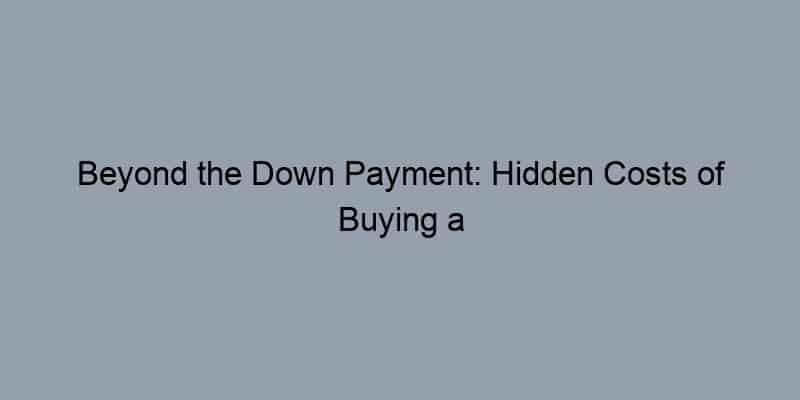Buying a home—it’s the American dream, right? But while many first-time buyers are prepared for the initial down payment, the reality of homeownership can be a bit more complex. As you start your home-buying journey, you might find that the sticker price isn’t the only thing you need to budget for. The hidden costs lurking in the shadows can quickly spiral into overwhelming expenses. So, what are these elusive costs? Let’s dive in to uncover the often-overlooked expenses that could make or break your home-buying experience.
1. Closing Costs: The Not-So-Secret Prices of Transitioning
When you finally find your dream home and negotiate the price, that’s just the beginning. Closing costs can account for 2% to 5% of the loan amount, and they can often catch first-time buyers off guard. These expenses may include:
- Loan Origination Fees: These can range from 0.5% to 1% of the loan amount and are charged by the lender for evaluating and preparing your loan.
- Title Insurance: This protects against any potential ownership disputes and typically costs between $1,000 and $2,500.
- Escrow Fees: Paid to a third-party service that handles the transfer of funds and paperwork, these fees can also add up quickly.
Closing costs can amount to thousands of dollars, so ensure you’ve budgeted accordingly.
2. Home Inspection & Appraisal
Before you seal the deal on your new abode, a home inspection is usually a non-negotiable part of the process. This could range from $300 to $500, depending on the property’s size and location. Skipping this essential step could lead to costly surprises down the line, such as mold, structural issues, or outdated plumbing.
Similarly, lenders typically require a property appraisal to ensure that the home is worth the amount you’re borrowing. While your lender usually pays for this, you might still need to front the cost temporarily (around $300 to $700). If the appraisal comes in lower than your offer, you may need to renegotiate.
3. Property Taxes
Property taxes can be a hefty burden and are often overlooked by new buyers. These can vary significantly based on your locality. Some areas have low property tax rates, while others can be extremely high—sometimes as much as 3% of the home’s value annually! Be sure to research the tax situation in your prospective neighborhood, as this cost will be an ongoing expense.
4. Homeowners Insurance
Once you’ve secured your home, another recurring cost comes into play: homeowners insurance. Most lenders require homebuyers to procure this insurance to protect their investment. Depending on the location and value of your home, homeowners insurance can range from $800 to $3,000 per year. Be prepared by shopping around for quotes and understanding what policies best suit your needs.
5. Maintenance and Repairs
Even if everything is functioning perfectly when you move in, it’s essential to budget for ongoing maintenance. The general rule of thumb is to allocate 1% to 2% of your home’s purchase price each year for maintenance and repairs. This means if you buy a $300,000 home, you should expect to set aside $3,000 to $6,000 annually for upkeep.
Consider these common repair costs:
- Roofing: $7,000 – $12,000
- HVAC: $5,000 – $10,000
- Plumbing: $2,500 – $5,000
It’s always wise to have a financial cushion for those unexpected repairs!
6. Homeowners Association (HOA) Fees
If you’re considering a condo or a home in a planned community, don’t forget about HOA fees. These can range dramatically from $100 to over $1,000 per month, depending on what services are covered—such as landscaping, pool maintenance, and other amenities. Always read the HOA rules and understand the fees before committing to a purchase.
7. Utilities
Once you own the home, utility bills can be a surprise for many new homeowners. Water, electricity, gas, internet, and trash collection can add an unexpected amount to your monthly budget. In some areas, heating and cooling costs can be significant, depending on your climate and the age of your home.
8. Moving Costs
Last but not least, factor in the costs associated with actually moving into your new home. Hiring movers can range from a few hundred to several thousand dollars, depending on how much stuff you have and how far you’re moving. If you’re doing it yourself, you’ll still need to consider gas, renting a truck, or buying supplies.
FAQs
1. What are the typical closing costs when buying a home?
Closing costs generally range from 2% to 5% of the loan amount and can include fees for loan origination, title insurance, appraisal, and escrow services.
2. How do I budget for maintenance costs?
A good rule of thumb is to set aside 1% to 2% of your home’s purchase price annually for ongoing maintenance and repairs.
3. Are property taxes included in my monthly mortgage payment?
Property taxes may be included in your monthly payment if your lender requires you to pay into an escrow account, where they will manage payments on your behalf.
4. Do homeowners insurance rates vary widely?
Yes, homeowners insurance rates can vary significantly based on the value of your home and its location. Always shop around to find the best rates.
5. What if my property appraisal is lower than my offer?
If the appraisal comes in lower, you may need to either renegotiate the price with the seller or come up with additional cash to make up the difference.
Conclusion
Becoming a homeowner is one of the most rewarding experiences in life, but it’s essential to go in with your eyes wide open. The hidden costs of buying a home can be substantial, but with thorough research and planning, you can budget effectively.
To make your home-buying journey easier, consider using resources like OfficialPropertyRecords.org for free access to property records. This site can help inform your decisions and prepare you for what’s ahead. With the right information at your fingertips, you’re one step closer to unlocking the front door to your dream home without any unwelcome surprises!

